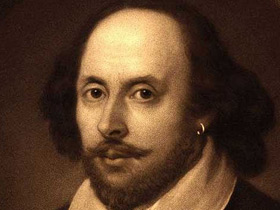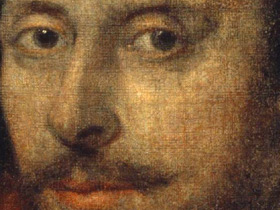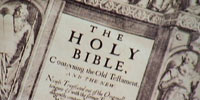Was Shakespeare Catholic?
by David E. Anderson
“Every age,” writes Shakespeare scholar and cultural critic Marjorie Garber, “creates its own Shakespeare.”
Our Shakespeare in the early 21st century seems to be the religious Shakespeare and, for some, a militantly Roman Catholic Shakespeare involved in an underground movement of secret Jesuit priests and recusant British aristocrats who wanted to consign Queen Elizabeth’s Protestant England to “the old religion” and restore loyalty to the papacy.

While Shakespearean studies has always been interested in the religious dimensions of Shakespeare’s historical context and how that was expressed in the plays, a new interest in the dramatist’s personal beliefs is fueled in part by a flurry of relatively recent scholarship, especially by Catholics, on the Reformation and Counter-Reformation in England and, to a lesser extent, the Continent. These revisionist historians contend that the Reformation never really took hold among “the people” in England, and despite efforts to enforce reform from above, much of the country remained steadfastly committed to the traditional folk Catholicism of the late Middle Ages.
There has also been renewed speculation about Shakespeare’s own religious commitments, based in part on the hypothesis that his father remained “a defiant Catholic in the midst of widespread anti-Catholic persecution,” as British author Joseph Pearce, a literature professor and writer-in-residence at Ave Maria University in Florida, claims in The Quest for Shakespeare, as well as highly speculative accounts of the so-called “lost years” of Shakespeare in the 1580s, a period during which little is known of his activities. Was he serving as a tutor to a Catholic family in intensely Catholic Lancashire, as some scholars suggest? Pearce also contends that “Catholic sympathies and sensibilities were an integral part of theatrical life in London” and claims it is “safe to presume though of course it can’t be proved” that “England’s greatest poet died a papist” and received last rites in accordance with the Catholic faith.
Or is all the Catholic revisionism, as Germaine Greer dismissively puts it in her new book, Shakespeare’s Wife, little more than “modish brouhaha”?
The most provocative of the recent Shakespeare books are Claire Asquith’s Shadowplay: The Hidden Beliefs and Coded Politics of William Shakespeare, a popular study of the playwright, and Richard Wilson’s Secret Shakespeare: Studies in Theatre, Religion, and Resistance, a denser, more academic examination. Both books find Shakespeare deeply Catholic, but they reach very different conclusions about what that meant in his life and work during a time of official Protestantism, the Jesuit mission to England, and sharp divisions among Anglicans, Puritans, and Catholics.
Wilson finds that Shakespeare was “a member of one of the most militant recusant families in a town that was a bastion of Elizabethan papist resistance.” Yet he also argues that “in play after play … there is an anti-Jesuit subtext’,’ and “it seems as if the dramatist takes a stand in resistance to [the Jesuit] resistance.”

Asquith’s very readable account takes the opposite approach. Inspired during a visit to the Soviet Union by what she took to be subversive anti-regime performances of the plays of Anton Chekhov, Asquith posits that Shakespeare was a secret Roman Catholic whose entire oeuvre is a series of coded messages to England’s persecuted Catholics or, alternatively, secretly coded appeals for religious tolerance of Catholics addressed to Queen Elizabeth, King James, and Prince Henry. In the end, she finds in his plays an encapsulated version of the “real” history of the Tudor/Stuart era during which Shakespeare lived over against the “Protestant” version of the English Reformation, a history that contemporary Catholic revisionists have now rediscovered.
Asquith’s reading requires a certain nimbleness of interpretation, perhaps too nimble. Shakespeare, after all, was a man of the theater; he wrote for performance, not for reading. A decent text for most the plays did not exist until 1623, seven years after his death. Most audiences were hearing these plays for the first time, and most probably heard them only once. Chekhov, appropriated by others for the anti-Soviet resistance, had a long textual and performance tradition, and given an audience’s familiarity with that tradition, contemporary actors could more easily play with it. But it seems unlikely that every time Catholics in a Shakespearean audience heard the word “fair” they would know it meant “Catholic” because of “the stress placed by Catholics on outward beauty,” as Asquith suggests, while every time they heard “dark” or “black” they thought of Protestantism, “associated with black print and sober dress.” Indeed, Asquith has a habit throughout the book of confusing Anglican Protestantism with Puritanism, where “sober dress” was a marker. Why might not Shakespeare’s audience have heard “dark” or “black” as “code” for Jesuits’ black dress?
Similarly, “old” refers to the Catholic religion and “new” or “young” to the Protestant faith, in Asquith’s reading. “Sun” suggests closeness to God, in contrast to “moon.” “To represent Elizabeth,” she writes, “Shakespeare used the classic image of inconstancy, the moon,” and adds, “The moon ruled over darkness; it was barren; it was eclipsed by heaven’s true light, the sun.” But why would only Catholics hear that? Why not Protestants or the religiously indifferent as well or, more certainly, the Elizabethan censors, highly sensitive to any political incorrectness and with access to working scripts that Shakespeare’s audience didn’t have? Most indications are that Shakespeare had next to no trouble with censorship, yet Asquith, virtually alone among scholars, asserts that in 1611 Shakespeare did not retire from public life, but was silenced by censors.
One more example is worth noting: the use of “tempest” in Twelfth Night. “Shakespeare’s many tempests,” Asquith writes, “always embody at least one of the two central Catholic criticisms of the Reformation: they defy the heavens, and they destroy a natural unity.” But in Twelfth Night the tempest-caused shipwreck that throws a number of characters onto the Illyrian seacoast is positive, and the characters are “innovative, energetic, and daring,” as Marjorie Garber writers in her essay on the play, qualities that characterized what could be called the early modern and Protestant critique of feudal Catholic Europe.

Asquith is to be commended for reminding readers how widely and deeply religion and religious conflict pervaded the society in which Shakespeare lived and wrote. It was, after all, the Reformation and Counter-Reformation era not only in England but throughout Europe. Elizabeth’s Protestantism, which sought in part to forge a third way between Rome and Geneva, was under siege from the moment she came to the throne in 1559, five years before Shakespeare’s birth. There was a rebellion of Catholic earls in the north in 1569 and 1570, Elizabeth was excommunicated, and Catholics were absolved of their duty to obey their sovereign. They were even encouraged to assassinate her, despite their public protestations that all they sought was religious toleration, most famously and eloquently expressed in poet and Jesuit priest Robert Southwell’s An Humble Supplication to Her Majesty. “Catholic historians have been loath to admit their Church’s involvement in any such acts of terrorism against Queen Elizabeth,” writes Wilson, but even they have reluctantly concluded that the English Jesuit leader Robert Persons was instrumental in persuading Pope Gregory XIII that “Elizabeth’s life was the only obstacle to the success of the enterprise” of reclaiming England for Catholicism and permission “ought therefore to be given … to arrange her assassination.”
But religious toleration was not a principle either side of the religious controversies accepted in the 16th and 17th centuries, and it was condemned by the Vatican. Alice Hogge, in her book God’s Secret Agents, quotes Persons as reportedly saying in 1597, “It has been seen that in England in the first 12 years when the Queen did not persecute Catholics there remained practically none, and with persecution the faith has come to be rekindled.”
There is no doubt that religion and religious conflict, entwined are they were with politics, were key themes in Shakespeare’s writing. But ultimately Asquith’s view of the religious dimension in Shakespeare’s work and his world is distorted, read through the lens of a romanticized, medieval Catholicism led by knight-like underground Jesuit priests and their elite, aristocratic supporters valiantly struggling against a persecuting Protestant Queen. Such a simplistic polarization fails to grasp the complexities of the religious, political, and economic situation and makes Shakespeare a one-dimensional propagandist, writing plays that tell the rank-and-file how to react and behave. In some sense, Asquith’s reading of Shakespeare makes him less an anti-regime subversive like the actors she encountered in the Soviet Union of the 1980s than it does an American communist party functionary of the 1950s, attempting to adapt to the ever-shifting party line coming from Moscow.
None of this is to deny the religious — and Christian — elements in Shakespeare. A number of other recent works, from the best-selling Will in the World by Stephen Greenblatt, to Shakespeare for All Time by eminent Shakespearean scholar and editor Stanley Wells, to Shakespeare’s Christianity, edited by Beatrice Bateson, to Shakespeare and the Bible by Steven Marx, all consider the religious dimension in Shakespeare’s life and work. Not all of them are convinced of the Catholic thesis, and one critic, Eric S. Mallin, an English professor at the University of Texas at Austin, even wants to argue for a “godless Shakespeare” who uses Christian themes “in decidedly irreligious or ironic ways.”
“The regular revival of an old fashion for maintaining that Shakespeare was a Catholic is based on no reliable external evidence that will stand up,” argues London English professor David Daniell in his essay in Shakespeare’s Christianity: “Shakespeare was baptized, married and buried a Protestant, and he lived and worked in a late Elizabethan and Jacobean cultural world that was overwhelmingly Protestant. To try and draw any facts about his personal beliefs from his poems and plays is not legitimate.” Frank Kermode, in his The Age of Shakespeare, contends: “Had he been, as some claim, a lifelong Catholic, it is strange that no unequivocal trace of his beliefs can be found in his thirty-seven plays.” It is not, these writers insist, that religion and the religious conflicts of the time are not evident in the work, but rather that it is impossible to define Shakespeare’s personal creed by a reading of the complex collection of more than three dozen plays.
One significant “Protestant” principle that can be associated with Shakespeare is his thoroughgoing use of the Bible. Scholars disagree on which Protestant Bible was his main source. Daniell believes Protestant martyr William Tyndale’s translations of the Gospels were critical, and he finds both Julius Caesar and Hamlet reflect Shakespeare writing Pauline theology in a Calvinist mode. Steven Marx says “most authorities” believe Shakespeare used the Geneva Bible, with its Calvinist notations, while Greenblatt argues the Bishops Bible of 1568 was the one Shakespeare knew and used most often.
Still other scholars, while finding both Catholic and Protestant elements in Shakespeare’s work, suggest that he left any rigid adherence to either faith behind as he grew older — or perhaps even earlier.

“We do not know what Shakespeare thought about any major question,” according to Oxford professor A.D. Nuttall in Shakespeare the Thinker. “The major question of the years through which he lived was religious,” but Nuttall cautions that the absence of “Protestant ferocity” in Shakespeare’s work does not equal “evidence of crypto-Catholicism.” Shakespeare’s plays are, rather, “a huge vanishing act” according to Nuttall, “a chronicle of immaculate absenteeism” according to Wilson. The playwright “took care to hide any hint of specific allegiance — and this is itself the political and religious import of his work,” Nuttall concludes.
Alice Hogge tells a story — about Lord Ferdinando Strange, an early Shakespeare patron — that seems as if it could be applied to Shakespeare himself. Lord Strange, like his father before him, held his personal religious views close and was considered a religious neutral. She quotes a Catholic assessment that found his “religion is held to be doubtful, so as some do think him to be of all three (Catholic, Protestant, Puritan) religions, and others none.”
Greenblatt, for his part, writes that Shakespeare probably attended the regular services in his Protestant parish because he never turns up on any of the lists of recusant Catholics and militant Puritans who refused to attend Anglican services. “But did he believe what he heard and recited? His works suggest that he did have faith, of a sort, but it was not a faith securely bound by either the Catholic Church or by the Church of England. By the 1590s, insofar as his could be situated in any institution at all, that institution was the theater.”
David E. Anderson, senior editor of Religion News Service, has also written for Religion & Ethics NewsWeekly on John Donne and American religious poems.


